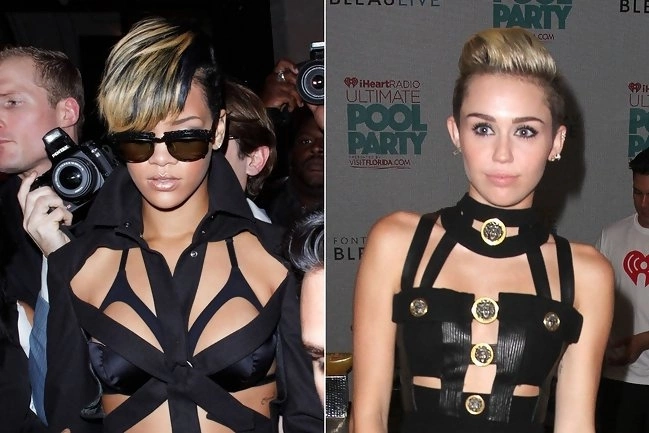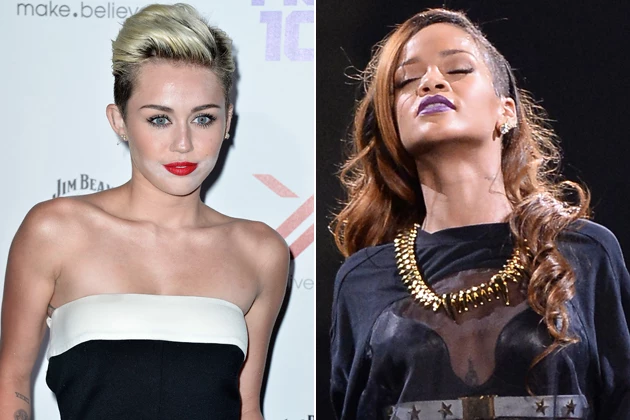👍Rihanna // ❤️Miley Cyrus

Rihanna, born February 20, 1988, in Barbados, redefined pop and R&B with her genre-blending sound and fearless persona. Her debut album, Music of the Sun (2005), introduced her Caribbean roots with tracks like “Pon de Replay,” but it was Good Girl Gone Bad (2007) that catapulted her to global stardom. Hits like “Umbrella” (featuring Jay-Z) and “Don’t Stop the Music” showcased her ability to fuse pop, R&B, and dance, earning her first Grammy. Her subsequent albums—Rated R (2009), with its darker edge; Loud (2010), boasting anthems like “Only Girl (In the World)”; Unapologetic (2012), featuring “Diamonds”; and Anti (2016), with its experimental vibe (“Work,” “Needed Me”)—demonstrated her versatility. With over 250 million records sold, Rihanna’s nine Grammys, 13 AMAs, and 12 Billboard Music Awards reflect her dominance. Her 2016 album Anti was a cultural milestone, blending reggae, dancehall, and soul, and is often cited as her most critically acclaimed work.

Beyond music, Rihanna’s entrepreneurial ventures have reshaped industries. Fenty Beauty (2017) disrupted the cosmetics world with its inclusive 40-shade foundation range, earning $570 million in revenue in its first year and setting a new standard for diversity. Savage X Fenty (2018), her lingerie line, champions body positivity, featuring diverse models and sizes, with its annual fashion shows streaming globally. Her fashion influence extends to collaborations with Puma and her luxury brand Fenty under LVMH, making her the first Black woman to lead an LVMH maison. In 2025, Rihanna’s net worth is estimated at $1.4 billion, driven by her business empire. Her philanthropy, through the Clara Lionel Foundation (founded 2012), supports education and climate resilience, notably funding disaster relief in the Caribbean. Rihanna’s ability to balance artistry, business, and advocacy makes her a global trailblazer.

Miley Cyrus, born November 23, 1992, in Tennessee, evolved from a Disney Channel star to a genre-defying artist known for her raw authenticity. As Hannah Montana (2006–2011), she became a teen idol, with early albums like Meet Miley Cyrus (2007) spawning hits like “See You Again.” Her 2013 album Bangerz marked a radical reinvention, embracing hip-hop and pop with “We Can’t Stop” and “Wrecking Ball,” the latter topping the Billboard Hot 100. The album’s provocative aesthetic sparked controversy but solidified her as a risk-taker. Subsequent albums—Miley Cyrus & Her Dead Petz (2015), a psychedelic experiment; Younger Now (2017), a country-pop return; Plastic Hearts (2020), a rock-infused triumph; and Something Beautiful (2025), blending pop and introspection—highlight her chameleon-like versatility. Her 2023 single “Flowers” became a global anthem of self-empowerment, earning a Grammy for Record of the Year.

Cyrus’s acting extends beyond Hannah Montana, with roles in films like The Last Song (2010) and Black Mirror (2019). Her philanthropy shines through the Happy Hippie Foundation (2014), which supports homeless youth and LGBTQ+ communities, raising millions for inclusive shelters. Cyrus’s advocacy for mental health, feminism, and environmental causes, combined with her unapologetic persona, resonates with fans. In 2025, her New Year’s Eve NBC special continues to draw massive viewership, and her net worth is estimated at $200 million. Cyrus’s willingness to reinvent herself while staying true to her roots makes her a standout in pop culture.

Rihanna and Miley Cyrus represent different facets of pop stardom but share a knack for reinvention and cultural influence. Rihanna’s Caribbean-infused sound and business acumen contrast with Cyrus’s genre-hopping rebellion and raw emotionality, yet both wield their platforms for impact. Rihanna’s Fenty brands set benchmarks for inclusivity, much like Cyrus’s Happy Hippie Foundation champions marginalized communities. Musically, Rihanna’s polished pop-R&B empire complements Cyrus’s eclectic, boundary-pushing discography. Both have navigated public scrutiny—Rihanna through personal challenges like her 2009 domestic violence experience, and Cyrus through her controversial image shifts—emerging as symbols of resilience. In 2025, Rihanna’s focus on business and selective music releases contrasts with Cyrus’s active touring and TV presence, yet both continue to shape pop culture through authenticity and innovation.











